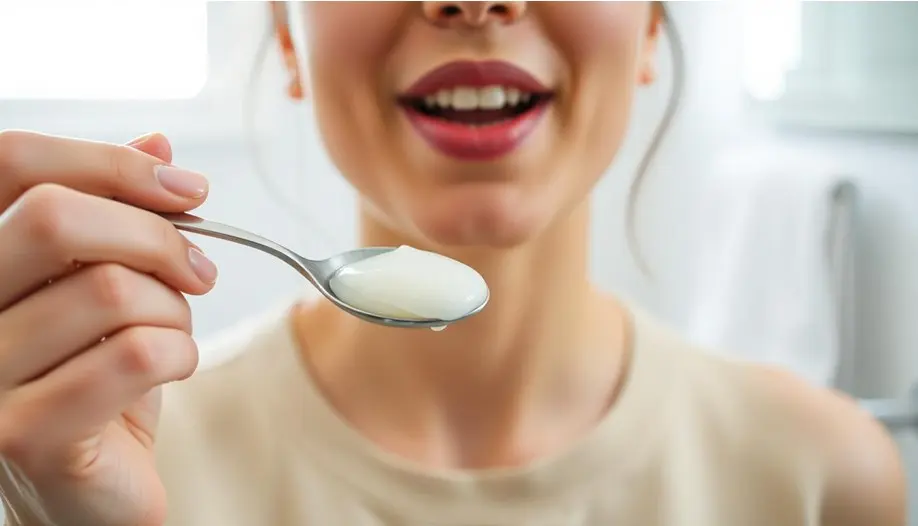The practice of using coconut oil for dental health has roots stretching back thousands of years. While modern dental care relies heavily on commercial products, many people are rediscovering this natural approach to oral hygiene. But what happens if you brush your teeth with coconut oil every day? This comprehensive guide explores the science, benefits, and potential drawbacks of this increasingly popular natural dental practice.
What Is Oil Pulling with Coconut Oil?
Oil pulling involves swishing coconut oil in the mouth for 15-20 minutes
Oil pulling is an ancient Ayurvedic practice that originated in India thousands of years ago. The technique involves swishing oil around in your mouth for an extended period, typically 15-20 minutes, before spitting it out. While various oils can be used, coconut oil has become particularly popular due to its pleasant taste and potential antimicrobial properties.
The practice is believed to “pull” bacteria and toxins from the mouth, improving oral health. When we talk about brushing teeth with coconut oil every day, we’re typically referring to either traditional oil pulling or using coconut oil as a toothpaste substitute or supplement.
Coconut oil contains approximately 50% lauric acid, a medium-chain fatty acid with antimicrobial properties. This component may help reduce harmful bacteria in the mouth, particularly Streptococcus mutans, which is a leading cause of tooth decay.
5 Potential Benefits of Brushing Teeth with Coconut Oil Daily
Key Takeaways
- Coconut oil contains lauric acid with antimicrobial properties
- May reduce harmful bacteria that cause tooth decay
- Can help decrease plaque buildup and gingivitis
- Should supplement, not replace, regular dental care
- Scientific evidence is promising but still limited
1. Reduces Harmful Bacteria in the Mouth

Research suggests that coconut oil can significantly reduce the number of harmful bacteria in your mouth. A 2016 study showed that oil pulling with coconut oil for just 10 minutes daily reduced Streptococcus mutans bacteria in saliva within two weeks. These bacteria are primary contributors to tooth decay and cavities.
The lauric acid in coconut oil has antimicrobial properties that can help combat these harmful bacteria. When you brush teeth with coconut oil every day, you may be creating an environment less hospitable to decay-causing microorganisms.
2. Decreases Plaque and Fights Gingivitis
Plaque is a sticky film of bacteria that forms on teeth. If not removed regularly, it can lead to gingivitis, an inflammation of the gums. Several studies have found that oil pulling with coconut oil can reduce plaque formation and help prevent plaque-induced gingivitis.
A pilot study observed significant reductions in both plaque index and gum bleeding after oil pulling with coconut oil for 30 days. The mechanical action of swishing combined with coconut oil’s antimicrobial properties may contribute to this benefit.
3. Freshens Breath Naturally
Bad breath (halitosis) is often caused by bacteria in the mouth. Since coconut oil can reduce these bacteria, regular use may help freshen your breath naturally. The pleasant taste of coconut oil also leaves a fresh feeling, unlike some commercial mouthwashes that can be harsh or medicinal.
While more research specifically on coconut oil and halitosis is needed, preliminary studies on oil pulling with various oils show promising results for reducing bad breath.
4. May Help Reduce Inflammation
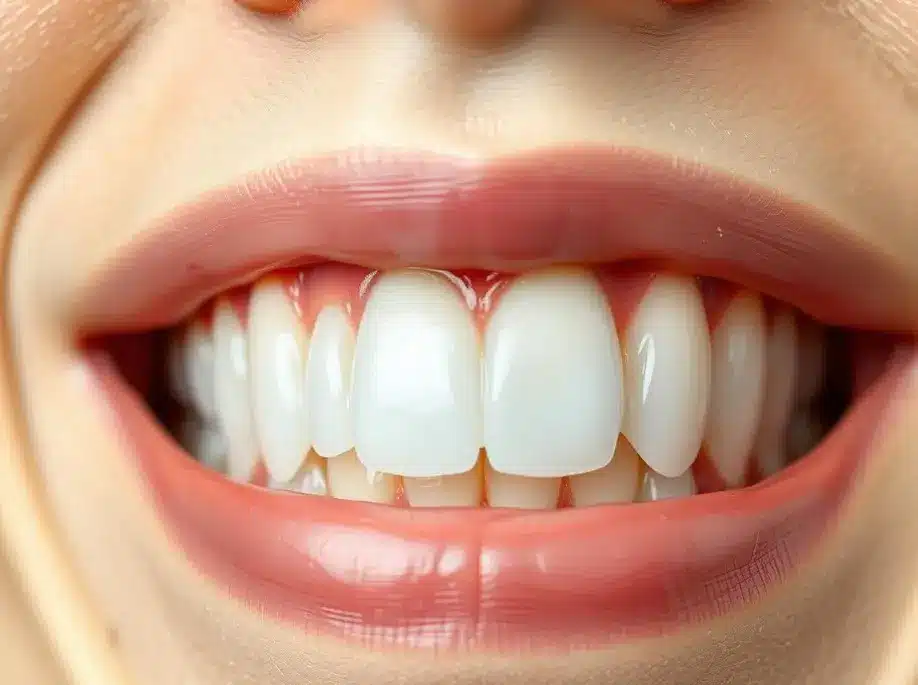
Coconut oil has natural anti-inflammatory properties that may benefit oral health. Inflammation in the mouth can lead to various issues, including gingivitis and periodontitis. By reducing inflammation, coconut oil may help maintain healthier gums and oral tissues.
The anti-inflammatory effect may be particularly beneficial for people with existing gum sensitivity or inflammation issues.
5. Potentially Whitens Teeth

While scientific evidence specifically confirming coconut oil’s teeth-whitening abilities is limited, anecdotal reports suggest it may help remove surface stains. The oil’s cleansing action might help lift some discoloration, leading to a brighter smile over time.
However, it’s important to note that coconut oil won’t change the natural color of your teeth or provide dramatic whitening effects like professional treatments.
3 Potential Risks and Drawbacks
1. Lack of Fluoride Protection
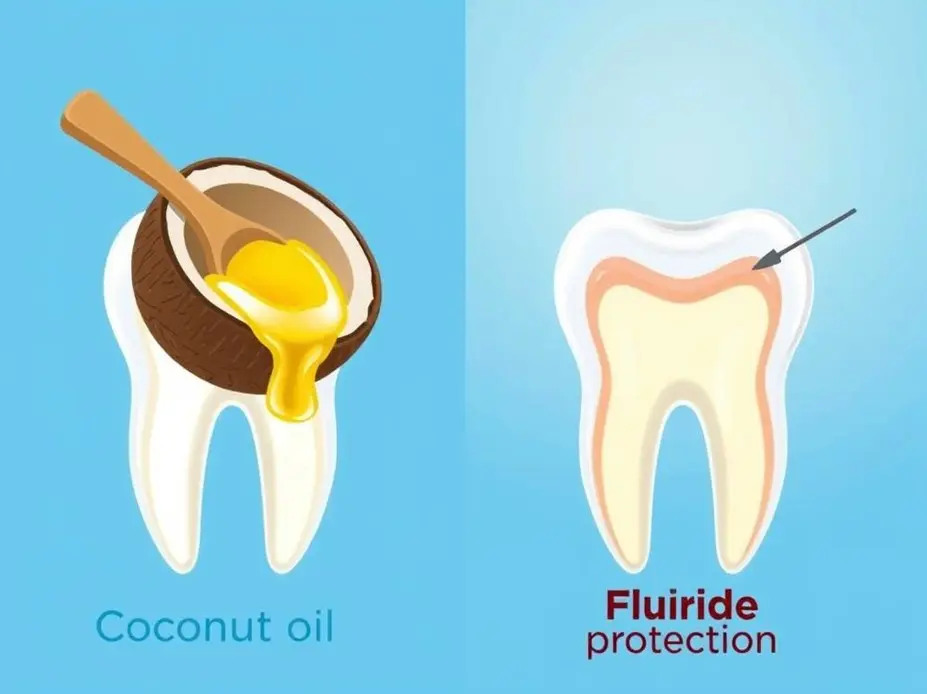
Unlike conventional toothpaste, coconut oil doesn’t contain fluoride, which helps strengthen tooth enamel and prevent decay. Relying solely on coconut oil without fluoride exposure could potentially increase your risk of cavities, especially if you’re already prone to them.
Dr. Jennifer Archibald, DDS, notes: “While coconut oil may have some antibacterial properties, it doesn’t replace the proven benefits of fluoride for cavity prevention. I recommend using coconut oil as a supplement to, not a replacement for, fluoride toothpaste.”
2. Consistency and Texture Challenges
Coconut oil is solid at room temperature (below 76°F) and liquefies when warmed. This changing consistency can make it challenging to use as a direct toothpaste replacement. The oily texture may also be unpleasant for some people, especially those new to the practice.
Additionally, the recommended 15-20 minutes for oil pulling can be difficult to maintain for busy individuals, making daily compliance challenging.
3. Potential Plumbing Issues
Spitting coconut oil down the drain can lead to plumbing problems over time as the oil solidifies in pipes. This is especially problematic in colder climates or during winter months. Always dispose of used coconut oil in the trash rather than the sink.
Dr. Michael Stern, DMD, cautions: “I’ve seen patients with significant plumbing bills after regularly spitting coconut oil down their drains. Always dispose of it in the trash to avoid costly repairs.”
Coconut Oil vs. Traditional Toothpaste: A Comparison
| Feature | Coconut Oil | Traditional Toothpaste |
| Antibacterial Properties | Natural antibacterial effects from lauric acid | Contains added antibacterial agents like triclosan |
| Fluoride Content | None | Contains fluoride to strengthen enamel |
| Plaque Removal | Moderate effectiveness through oil pulling | Effective with proper brushing technique |
| Breath Freshening | Mild natural freshening | Strong immediate freshening from added flavors |
| Whitening Ability | Minimal to moderate surface stain removal | Varies by product; some contain specific whitening agents |
| Ingredients | Single natural ingredient | Multiple ingredients including synthetic compounds |
| Scientific Evidence | Limited but growing research | Extensive clinical research and testing |
What Dental Professionals Say
“Coconut oil pulling can be a beneficial addition to your oral hygiene routine, but it shouldn’t replace brushing with fluoride toothpaste and flossing. I’ve seen improvements in patients who use it as a supplementary practice, particularly those with mild gingivitis.”
— Dr. Sarah Johnson, DDS, Holistic Dental Practice
“The research on coconut oil for dental health is promising but still developing. What we do know is that it has antimicrobial properties that may help reduce harmful bacteria. I recommend it to patients interested in natural approaches, but always alongside conventional care.”
— Dr. Robert Chen, DMD, Clinical Researcher in Preventive Dentistry
“For patients with sensitivities to commercial oral care products, coconut oil can be a gentle alternative. However, I emphasize that they should still get regular dental checkups and use fluoride products to prevent cavities.”
— Dr. Lisa Martinez, DDS, Specialist in Sensitive Dentistry
Step-by-Step Guide to Brushing Teeth with Coconut Oil
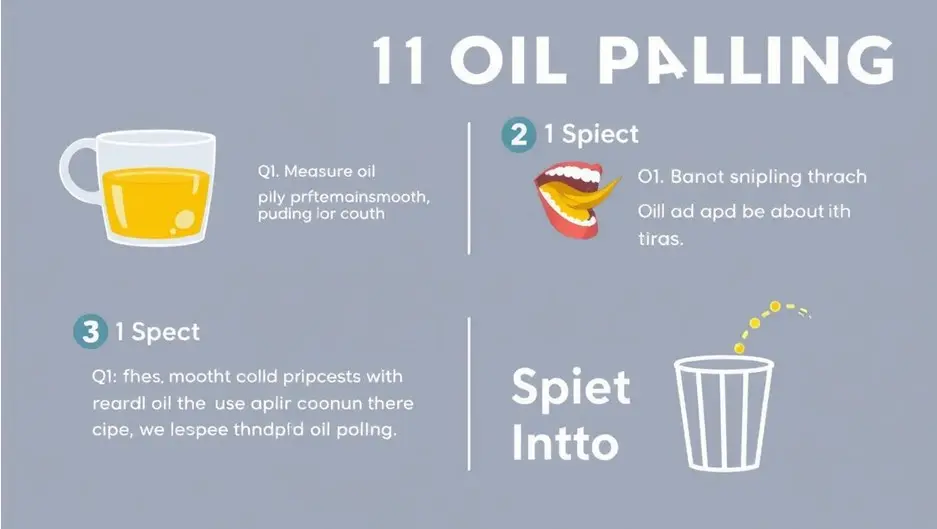
Traditional Oil Pulling Method
- Start with 1-2 teaspoons of organic, extra-virgin coconut oil. (Use less when beginning to avoid jaw fatigue)
- If the oil is solid, allow it to melt in your mouth for a few seconds.
- Gently swish the oil around your mouth, between teeth, and around gums for 15-20 minutes. (Start with 5 minutes if you’re new to the practice)
- Avoid swallowing the oil as it contains bacteria from your mouth.
- Spit the oil into a trash can, not the sink or toilet, to avoid plumbing issues.
- Rinse your mouth thoroughly with warm water.
- Brush your teeth as normal with regular toothpaste.
Coconut Oil as Toothpaste Supplement
- Place a small amount of coconut oil (pea-sized) on your toothbrush.
- Add a small amount of regular toothpaste on top if desired.
- Brush normally for 2 minutes, reaching all surfaces of your teeth.
- Spit into a trash can rather than the sink.
- Rinse thoroughly with water.
Pro Tip: For best results, perform oil pulling in the morning before eating or drinking anything. If using as a supplement to regular brushing, you can do it at any time, but consistency is key.
Frequently Asked Questions

Is coconut oil better than toothpaste?
Coconut oil is not better than toothpaste but offers different benefits. Traditional toothpaste contains fluoride, which is proven to strengthen enamel and prevent cavities. Coconut oil has natural antibacterial properties but lacks fluoride protection. For optimal dental health, most experts recommend using coconut oil as a supplement to, not a replacement for, regular toothpaste.
Can children use coconut oil for brushing teeth?
Children can use coconut oil for dental care, but with supervision. For oil pulling, it’s generally not recommended for children under 5 as they may swallow the oil. Older children can try with smaller amounts (½ teaspoon) for shorter durations (5-10 minutes). Always consult with a pediatric dentist before introducing coconut oil to a child’s dental routine, and ensure they maintain regular brushing with age-appropriate fluoride toothpaste.
How long until I see results from brushing teeth with coconut oil?
Results vary by individual, but many people report fresher breath almost immediately. For plaque reduction and gum health improvements, studies suggest noticeable changes after 1-2 weeks of daily use. Potential whitening effects may take several weeks of consistent use. For best results, use coconut oil daily as part of a comprehensive oral hygiene routine that includes regular brushing, flossing, and dental checkups.
Can coconut oil reverse cavities?
No, coconut oil cannot reverse existing cavities. Once tooth decay has created a cavity, professional dental treatment is necessary. Coconut oil may help prevent new cavities by reducing harmful bacteria, but it cannot rebuild tooth structure that has been damaged. If you suspect you have cavities, consult with a dentist promptly.
What type of coconut oil is best for dental use?
Organic, extra-virgin, cold-pressed coconut oil is generally considered best for dental use. This type undergoes minimal processing, retaining more of its natural antimicrobial properties. Avoid refined coconut oils that may contain additives or undergo chemical processing. Always choose food-grade coconut oil rather than cosmetic versions for oral use.
Conclusion: Finding Balance in Your Dental Care Routine
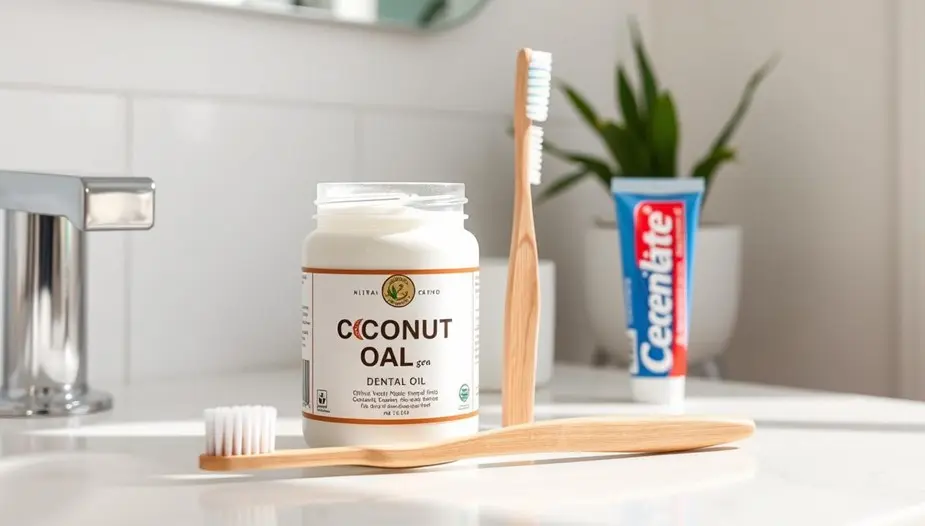
Brushing teeth with coconut oil every day offers potential benefits for your oral health, particularly in reducing harmful bacteria, fighting plaque, and freshening breath naturally. The practice has historical roots and is gaining scientific support through emerging research.
However, the consensus among dental professionals is clear: coconut oil works best as a supplement to, not a replacement for, conventional dental care. The lack of fluoride and limited scientific evidence means that relying solely on coconut oil could leave gaps in your dental protection.
For optimal results, consider incorporating coconut oil into a comprehensive oral hygiene routine that includes:
- Brushing twice daily with fluoride toothpaste
- Flossing daily
- Oil pulling with coconut oil as a supplementary practice
- Regular dental checkups and cleanings
- A balanced diet low in sugary foods and drinks
Ready to Try Coconut Oil for Your Dental Health?
Start with just 5 minutes of oil pulling daily and gradually increase to the recommended 15-20 minutes. Remember to use organic, extra-virgin coconut oil for best results. By balancing natural approaches with proven dental care practices, you can enjoy the benefits of both worlds while maintaining optimal oral health for years to come.
Also Read-6 Ways Personalized Healthcare Enhances Your Well-being
